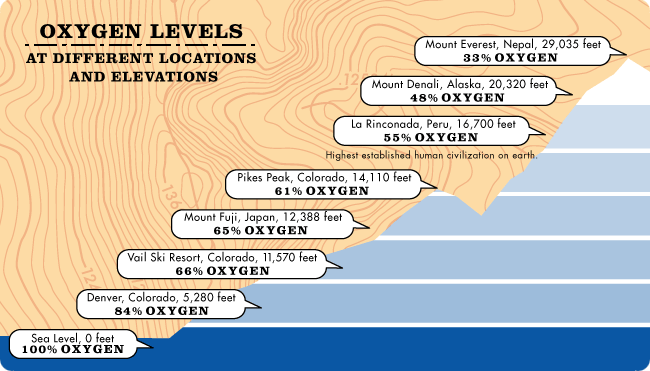How is it treated?

The best treatment for altitude sickness is to go to a lower altitude. But if you have mild symptoms, you may be able to stay at that altitude and let your body get used to it. Symptoms often occur if you have just arrived at a mountain resort from a lower altitude.
You may also be able to use oxygen or a specially designed pressure chamber to treat altitude sickness.
If you stay at a high altitude, rest. You can explore the area, but take it easy. Limit any walking or activity. Drink plenty of water, but do not drink alcohol. Do not go to a higher altitude until your symptoms go away. This may take from 12 hours to 3 or 4 days.
For the headache, you can take an over-the-counter medicine, such as ibuprofen(Advil, Motrin) or naproxen (Aleve). Do not give aspirin to anyone younger than 20. Aspirin has been linked to Reye syndrome, a serious illness. You may also use medicine to reduce feeling sick to your stomach or other symptoms.
A doctor can give you acetazolamide (Diamox). This speeds up how fast your body gets used to the higher altitude. Nifedipine (Procardia) and dexamethasone are also used for altitude sickness. You may also be able to use oxygen or a specially designed pressure chamber to treat altitude sickness.
Go to a lower altitude if your symptoms are moderate to severe, they get worse, or medicine or oxygen treatment does not help. Go down at least 1500 ft (457 m). Go to a lower altitude as fast as you can or get emergency help if someone with you has severe symptoms such as being confused or not being able to walk straight. Go with the person. Never let someone with severe altitude sickness go down alone.
Can you prevent altitude sickness?
You may be able to prevent altitude sickness by taking your time when you go to high altitudes, using medicine in advance, and eating certain foods.
- If you are going to altitudes higher than 8000 ft (2438 m), try to spend a night at a medium altitude before going higher. For example, in the United States, spend a night in Denver before going to the Rocky Mountains.
- Do not fly into high-altitude cities. If this is not possible, avoid large meals, alcohol, and being very active after you arrive. Rest, and drink plenty of liquids. If you have symptoms, do not go higher until they have gone away. Examples of high-altitude cities include Cuzco, Peru; La Paz, Bolivia; and Lhasa, Tibet.
- Sleep at an altitude that is lower than the altitude you were at during the day. For example, if you ski at 9500 ft (2896 m) during the day, sleep the night before and the night after at 8000 ft (2438 m). "Climb high, sleep low" is standard practice for those who spend time at high altitudes.
- One study showed that starting to take ibuprofen 6 hours before climbing to high elevations and then taking it every 6 hours while climbing may help prevent altitude sickness.1 Ibuprofen may also reduce the symptoms of altitude sickness if you do get it.
- You may consider taking acetazolamide (Diamox) or possibly dexamethasone before going to a high altitude.2 Talk to your doctor about this.
- Eat a lot of carbohydrates. This includes breads, cereals, grains, and pasta.
What if you have a lung problem or other disease?
Experts do not know much about how altitude affects other diseases. Many people with allergic asthma do better at high altitudes. Still, if you have asthma and are going to high altitudes, continue to use your daily controller medicine and take your quick-relief medicine with you. Talk with your doctor about altitude sickness if you have long-term diseases, especially heart problems, sickle cell anemia, chronic obstructive pulmonary disease (COPD), or sleep apnea.

No comments:
Post a Comment